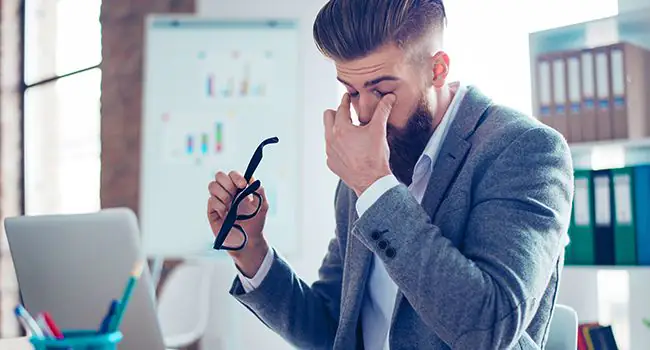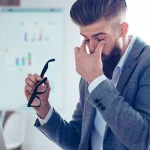No matter how many times you have been told that it’s bad to cry, please know that it’s actually really good. Crying is not only a great way of letting out your bottled emotions but is also very good for your eyes!
Your tears are a combination of water, oil, mucus, and antibodies that help keep your eyes lubricated and prevent infections. When you don’t produce enough tears, your eyes go dry.
Dry eyes or dry eye syndrome is a common condition faced when the tear production is not sufficient enough to provide the required lubrication to your eyes. This may also happen when the tears produced are not of good quality (which means that the combination of water, oil, mucus, and antibodies is not in the correct ratio). The imbalance in your tear system and the poor quality of your tears lead to dry eyes, and this can cause irritation, discomfort, and even blurred vision.
There is also a rare condition in which dry eyes lead to excess tears. This happens because the irritation in your eyes sends signals to your brain for more lubrication. The condition is called reverse tearing. Unfortunately, these tears do not help with dry eyes because they are mostly just water. Oil is an essential part of moisturization as it is absorbed by the tissues at a deeper level, unlike water.
Why would you develop dry eyes?
A natural imbalance in your tears system leading to fewer tears or poor quality tears is one of the main dry eyes causes. There are a number of causes that may disrupt your natural tear system. These range from environmental factors like excessive usage of heaters or air conditioners (as both can dry out your tear film) to other complex causes like hormonal changes, autoimmune disorders, or allergies.
Other causes of dry eyes include the natural ageing process, menopause, certain medications like antihistamines, and the incorrect usage of contact lenses (this may lead to corneal nerve dysfunction or damage). All these factors lead to decreased tear formation, which eventually causes dry eyes.
Apart from the factors mentioned above, a fairly common cause of dry eyes is increased tear evaporation. This results from blocked or clogged meibomian glands. Prolonged exposure to hot or dry air, allergies affecting the eyes, vitamin A deficiency, and meibomian gland dysfunction are some of the factors that lead to increased tear evaporation.
Knowing what causes dry eyes is essential as it helps with the effective treatment of dry eyes.
What are the typical symptoms of dry eyes?
Some common symptoms that you should look out for are:
- Irritation and itching in the eyes
- Blurry vision
- Redness and pain
- Increased sensitivity to light
- Watery eyes Burning or scratchy sensation in the eyes
If you experience any of these symptoms, it is best to consult an ophthalmologist to get the correct diagnosis and treatment.
What is the treatment for dry eyes?
Now that we know what dry eyes are and what causes them, it’s time that we also take a look at dry eyes treatment options. Some of these are:
1. Stimulation of the production of artificial tears
Artificial tears are produced by using eye drops that increase the moisture of the eyes. This is one of the most commonly used treatments for dry eyes.
2. Lacrimal plug or punctal occlusion
A lacrimal plug is used to block the punctum or drainage holes that drain the tears from your eyes and prevent the excessive loss of tears.
3. Intense Pulse Light Therapy (IPL)
This technology helps by unblocking the clogged meibomian glands as well as by reducing the inflammation around your eyelids thus increasing the moisture and tears in your eyes.
4. Surgery
Surgery is only carried out when this syndrome is severe, and no other treatment helps. The surgical procedure includes permanently plugging the ducts at the corner of your eyes to prevent the overflow of tears.
5. Medical treatment
Medicines like cyclosporine and lifitegrast are used in dry eyes treatment. Both these medications are eye drops that are taken to increase tear production.
In severe cases, corticosteroid eye drops are prescribed.
If you ever suffer from dry eyes, there’s no need to panic. As you now know, this condition is very common and more often than not, can be easily treated. So, all you need to do is maintain good eye care and not ignore any symptoms. Always consult an ophthalmologist if you experience anything out of the ordinary.
Remember, your eyes are the windows through which you see the world. Take good care of them.
Why Choose Centre for Sight?
Taking good care of your eyes starts with finding a good ophthalmologist. This is something you don’t need to worry about when you are at the Centre for Sight. Our highly experienced will introduce you to all the different ways of treating dry eyes and help you find the one best suited for you.
Article: Dry Eyes: Possibly the Most Annoying Condition One Could Face!
Author: CFS Editorial Team | July 07 2021 | UPDATED 02:00 IST
*The views expressed here are solely those of the author in his private capacity and do not in any way represent the views of Centre for Sight.





